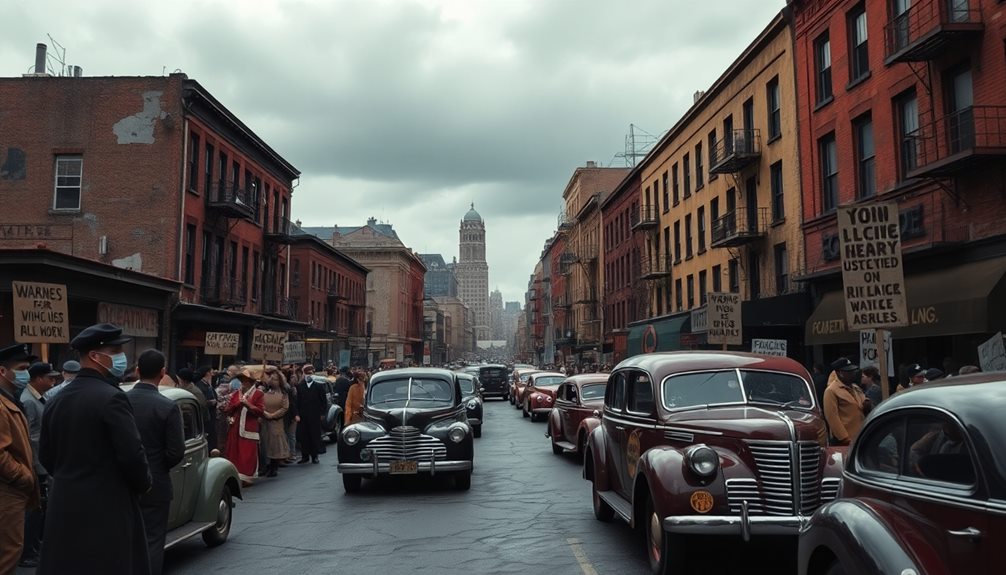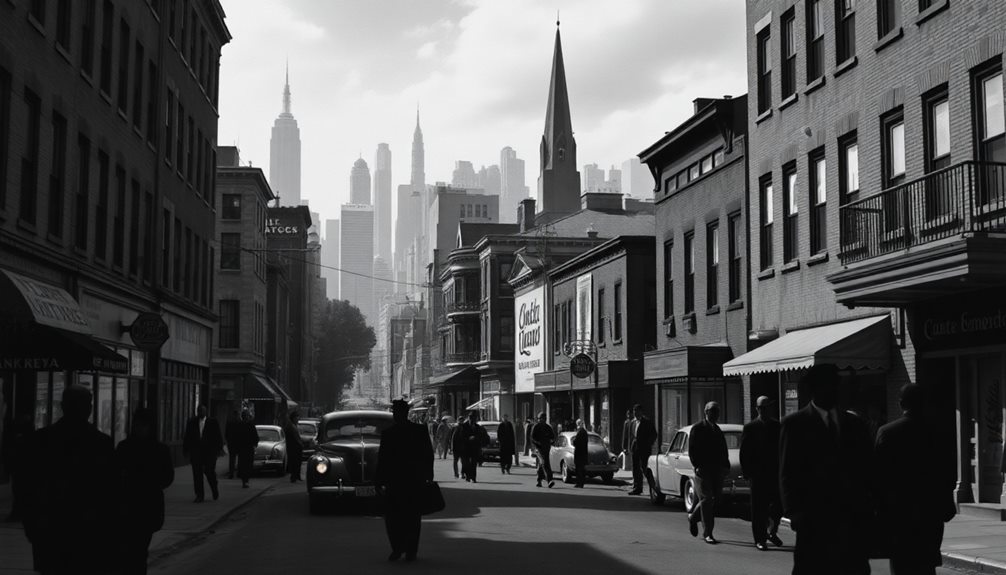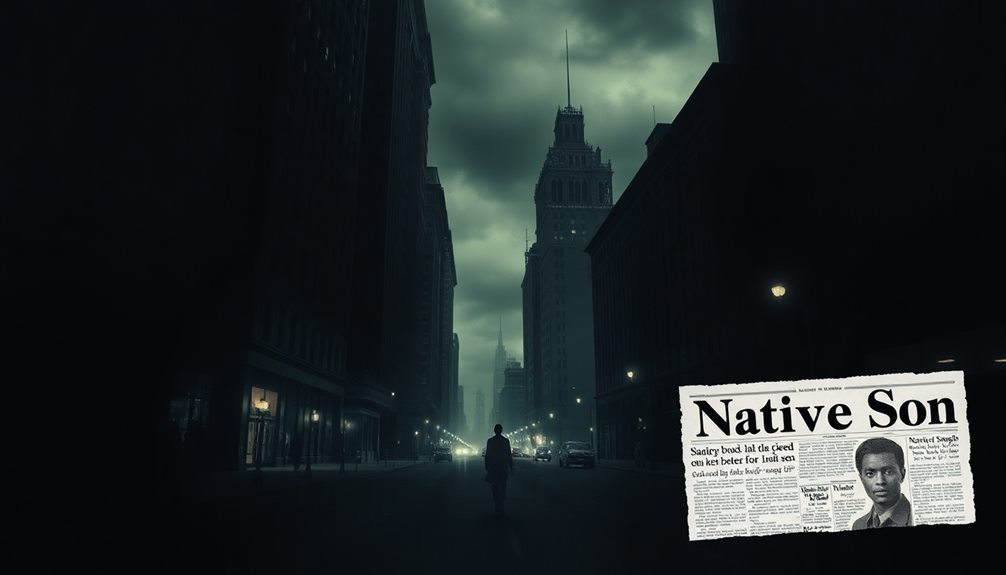*Native Son* was published in March 1940, a time when America faced harsh realities like the Great Depression and deep-rooted racial tensions. As you explore its historical context, you'll see how the novel captures the struggles of African Americans during this turbulent period. Richard Wright's powerful narrative reflects systemic racism and economic disparities that shaped the lives of many. The book's initial reception sparked controversy, drawing attention to issues of violence and stereotypes. By understanding its backdrop, you'll gain insight into why it remains essential in discussions about race and social justice today.
Publication Details
*Native Son* was published in March 1940 by Richard Wright, and it quickly became a landmark in African American literature. Within just three weeks of its release, the novel sold an astounding 250,000 copies, demonstrating its immediate impact on American readers.
Harper & Brothers recognized the significance of Wright's exploration of systemic racism, releasing a work that directly addressed the racial tensions simmering in the United States during the Great Depression.
The publication came at a time when the failure of anti-lynching legislation heightened feelings of injustice and despair among African Americans. Wright's novel not only reflected the harsh realities of life for Black individuals in America but also challenged societal norms by shedding light on the pervasive issues of racism and oppression.
In 1991, a new edition of *Native Son* restored previously censored content and added scholarly materials, emphasizing its lasting relevance in discussions about race and justice.
This ongoing dialogue illustrates how the book transcended its time, continuing to resonate with readers who grapple with the effects of systemic racism today. Wright's work remains a powerful reflection of the struggles faced by African Americans.
Historical Background
The historical backdrop of Richard Wright's *Native Son* is essential for understanding its themes and impact. Published in 1940, the novel reflects the struggles faced by African Americans, particularly during the Great Depression. The economic hardships of this era meant limited job opportunities, especially for marginalized communities like those living on Chicago's South Side.
Bigger Thomas, the protagonist, embodies the despair and anger stemming from these social conditions. His actions throughout the novel illustrate the dehumanizing effects of racism and systemic oppression that were prevalent at the time.
As you explore the narrative, you'll see how systemic racism and the failure of an anti-lynching bill in Congress highlight the violent realities of racism in America. This period saw a significant influx of African Americans into urban areas, which resulted in overcrowded and impoverished neighborhoods, exacerbating the challenges they faced.
Historical events, such as the Scottsboro Boys trial, further illustrate the deep-seated racial biases entrenched in the justice system. Wright critiques these injustices through Bigger's experiences, making it clear that the fight for racial equality isn't just a personal struggle but a societal one.
Understanding this historical context enriches your reading of *Native Son* and underscores its enduring relevance.
Social Climate of the 1930s

During the 1930s, widespread economic hardship defined the social climate, particularly for African Americans living in urban areas like Chicago. The Great Depression led to soaring unemployment, with African Americans facing even greater challenges due to racial segregation and systemic racism. Limited job opportunities often forced them into the poorest neighborhoods, like the Black Belt, where despair and anger permeated daily life.
This period also saw the rise of literary voices like Richard Wright, who sought to illuminate the struggles of the Black experience in America, much like Ta-Nehisi Coates later did in his work, addressing the ongoing impact of systemic oppression on marginalized communities systemic racism and historical legacies.
Societal injustices were glaringly evident, exemplified by the failure of an anti-lynching bill in Congress. This lack of legislative protection underscored the violence and discrimination African Americans endured. In response to these harsh realities, the Communist Movement gained traction, aligning with labor movements to advocate for the rights of marginalized workers, including African Americans.
This turbulent social climate fueled a pervasive sense of hopelessness among many. Richard Wright sought to capture this despair and anger in his writing, particularly in *Native Son*. His work reflects the struggles and complexities faced by African Americans during this tumultuous decade, shedding light on the broader societal issues that shaped their lives and experiences.
Impact of the Great Depression
Countless African Americans faced dire consequences as the Great Depression unfolded, with unemployment rates soaring to about 50% by the early 1930s. This economic hardship hit Black Americans particularly hard, especially in urban areas like Chicago. Many sought jobs in cities, only to find a lack of opportunity and overcrowded, impoverished living conditions.
Bigger Thomas, the protagonist in *Native Son*, exemplifies this struggle, living in a cramped apartment that reflects the desperate circumstances faced by countless families. The resilience demonstrated by individuals during this time can be likened to historical resistance movements, where collective action was essential in fighting against systemic oppression and injustice, showcasing the power of unity in the face of adversity.
Acts of courage and defiance during such challenging periods remind us of the strength found in solidarity. The limited job opportunities during this time forced many Black workers into low-paying, unstable positions, contributing to a pervasive sense of hopelessness and desperation.
The systemic racial inequalities that plagued society were only exacerbated by the Great Depression, as the federal government failed to address these issues effectively. This neglect reinforced the barriers that African Americans faced, making it nearly impossible for them to escape the cycle of poverty.
Richard Wright's narrative captures this grim reality, illustrating how the Great Depression shaped the lives of individuals like Bigger. Their experiences reveal the deep-seated challenges of an era marked by both economic turmoil and racial injustice, leaving a lasting impact on Black communities.
Racial Dynamics in America

In the 1930s, you'd see how systemic racism shaped daily life for African Americans, especially in urban centers like Chicago. Economic disparities made it even harder for Black individuals to find jobs and escape poverty, while segregation kept them trapped in a cycle of inequality.
The struggle for dignity and equality resonated with the themes of resilience and courage, much like the experiences of characters in literature set during oppressive times, such as in the power of resilience.
These racial dynamics not only influenced personal experiences but also fueled broader movements for change.
Systemic Racism Effects
Systemic racism profoundly shapes the racial dynamics in America, creating a landscape where opportunity and equity are often out of reach for marginalized communities.
In Richard Wright's *Native Son*, you see the harsh realities faced by Bigger Thomas, a Black man maneuvering the oppressive environment of 1930s Chicago. Racial segregation confines him to the poverty-stricken Black Belt, illustrating how systemic racism intertwines economic disadvantage with social oppression.
Bigger's story reflects the broader societal dynamics of the time, where Black individuals were frequently perceived as threats, reinforcing harmful stereotypes and inequalities.
The murder of Mary Dalton marks a vital turning point, exposing the deadly consequences of ingrained racial biases. It also reveals how the justice system fails to protect Black lives, further entrenching systemic racism in society.
Wright's portrayal of Bigger's struggles emphasizes the urgent need for societal change to dismantle these entrenched inequities.
Understanding these systemic effects is essential in recognizing the ongoing challenges that African Americans face today, as the echoes of past injustices continue to resonate through contemporary issues.
Economic Disparities Faced
The economic landscape of 1930s America starkly illustrated the disparities faced by African Americans, particularly during the Great Depression. Unemployment rates soared, hitting Black communities much harder than their white counterparts. Many African Americans found themselves confined to low-paying, unstable jobs while others struggled in impoverished neighborhoods like the Black Belt in Chicago.
Systemic racism entrenched these economic disparities, preventing many employers from even considering Black applicants. Richard Wright's work highlights the dire circumstances faced by individuals caught in this cycle of poverty, showcasing how racial injustices contributed to the struggle for economic equality.
The failure of an anti-lynching bill during this time further exemplified the lack of political will to address the economic inequalities that plagued African Americans. Although organizations like the Congress of Industrial Organizations (CIO) emerged to advocate for Black workers, systemic barriers continued to hinder meaningful progress.
This context not only underscores the urgent need for change but also illuminates the broader implications of economic disparities on the lives of African Americans, shaping their experiences and aspirations during a tumultuous era.
Racial Segregation Experiences
Amid the harsh realities of the 1930s, racial segregation permeated every aspect of life for African Americans, especially in urban centers like Chicago. After the Great Migration, many Black people sought refuge from the oppressive Jim Crow laws of the South, only to face new challenges.
You'd find that in Chicago's South Side, segregation confined Black communities to overcrowded neighborhoods, limiting their access to jobs, education, and essential services.
Systemic discrimination was rampant, creating stark economic disparities between White people and Black residents. While many White workers thrived on the industrial boom, African Americans were often relegated to low-paying jobs with little opportunity for advancement.
The failure of anti-lynching legislation in Congress during this period highlighted the lack of protection against racial violence, further entrenching a sense of vulnerability among Black people.
In this historical context, the experiences of racial segregation profoundly impacted the lives of African Americans. Their reality wasn't just about physical separation but also about enduring the psychological and economic scars that segregation left behind, shaping their struggles and aspirations in profound ways.
Reception and Controversy
Upon its release, Richard Wright's *Native Son* sparked considerable debate and controversy, reflecting the raw nerve of race relations in America. The novel quickly sold 250,000 copies within three weeks, indicating its powerful impact. Its significance was further highlighted by Wright's commitment to social justice, as he used literature to challenge the status quo and inspire equality efforts the struggles faced by Black Americans.
However, its graphic violence and profanity led to bans and challenges, landing it 71st on the American Library Association's list of frequently challenged works.
Critics like James Baldwin labeled *Native Son* a protest novel, arguing it reinforced negative stereotypes of Black masculinity through the character Bigger Thomas. Some viewed Wright's portrayal of Black life as grim, raising alarms among White audiences.
Additionally, the book's political implications resulted in accusations that Wright was pushing a Communist agenda, further intensifying the controversy during a politically charged era.
- *Native Son* sold 250,000 copies within three weeks.
- Faced bans due to graphic content and racial issues.
- Labeled as a protest novel, critiqued for reinforcing stereotypes.
- Accused of promoting Communism amidst political tensions.
Despite the backlash, Wright's work opened vital conversations about race, oppression, and societal change, solidifying his role as a key voice in African American literature.
Legacy and Significance

When you think about the legacy of *Native Son*, it's clear how profoundly it shaped American literature and discussions around race.
The novel's exploration of systemic oppression and the human experience parallels narratives found in works like the triumph of the human spirit, illustrating the resilience of individuals in the face of adversity.
Its themes continue to resonate today, making it an essential part of conversations on social justice and identity.
This novel not only influenced future writers, but it also remains a relevant text in classrooms, challenging readers to confront ongoing issues of inequality.
Impact on Literature
*Native Son* stands as a significant work in American literature, profoundly shaping the discourse around race and identity. Richard Wright's groundbreaking novel, published in 1940, captured the stark realities of systemic racism and poverty faced by African Americans. Its immediate impact is evident, with 250,000 copies selling within three weeks, igniting discussions about race relations across the nation.
The novel's legacy extends beyond its publication, influencing subsequent generations of writers who tackled themes of racial identity and injustice. You can see its far-reaching effects through:
- The exploration of Black masculinity, presenting a raw portrayal that challenged societal norms.
- The controversial content that led to frequent challenges and bans, highlighting ongoing tensions around race in literature.
- The 1991 edition, which restored previously censored material, further solidifying its role in educational discussions.
- The way it inspired writers like Ralph Ellison, James Baldwin, and Toni Morrison to investigate deeper into the complexities of African American experiences.
Through its impact, Native Son remains a significant text in understanding America's literary landscape and the intricacies of race and identity.
Cultural Relevance Today
The cultural relevance of *Native Son* remains strikingly evident today, as it continues to ignite conversations about systemic racism and social justice. Richard Wright's powerful narrative reflects the ongoing inequalities faced by marginalized communities, making it an essential text for understanding America's complex racial landscape. The book is frequently included in educational curricula, encouraging students to confront themes of race, identity, and oppression.
Moreover, *Native Son* has inspired numerous adaptations and references in popular culture, including films like *American History X* and *The Help*, showcasing its lasting impact on societal discourse. The portrayal of Bigger Thomas has sparked important debates about representation and the complexities of Black masculinity, deepening dialogues around race and identity in contemporary literature and media.
Wright's work has influenced generations of writers, including Ralph Ellison and Toni Morrison, ensuring that its themes resonate with future audiences.
As you engage with *Native Son*, you'll find it not only a cornerstone of African American literature but also a catalyst for ongoing discussions about social justice and the fight against systemic racism. Its legacy endures, reminding us that the struggle for equality continues.
Conclusion
To sum up, "Native Son" remains a powerful reflection of its time, shedding light on the racial and social issues that persist today. For instance, consider a modern case where a young Black man faces systemic bias in the justice system, echoing Bigger Thomas's struggles. Such parallels remind us that while decades have passed, the fight for equality continues. Wright's work urges you to confront these realities, inspiring change in a society still grappling with its past.



